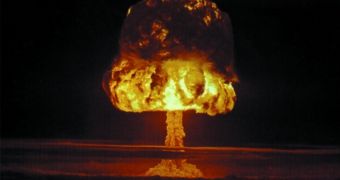Three prestigious authors, two great books, one important goal. The books that should be out by January next year address the uncomfortable matters of the atomic bomb – its spreading, the involved politics, nuclear proliferation and the like – and warn once again about the dangerous course the nuclear efforts are set on today. They describe the informational path that the atomic bomb knowledge followed, as a result of geopolitical interests, destroy myths and offer alternative approaches to the threat reduction efforts.
It is known that, after the obliteration of the Japanese cities Hiroshima and Nagasaki in 1945, the father of the atomic bomb, J. Robert Oppenheimer, working on the Manhattan Project at Los Alamos at the time, told his team that the bombs “are not too hard to make. They will be universal if people wish to make them universal”. He thought that, since the laws of physics are universal, everyone would come up with the ideas that led to the development of the weapon of mass destruction.
He said that an effort to stop its spreading would be very hard, if not impossible and pointless to make. Thomas C. Reed, who worked at the Livermore weapons laboratory in California and was also a secretary of the Air Force, together with Danny B. Stillman, ex-director of intelligence at Los Alamos, wrote “The Nuclear Express: A Political History of the Bomb and its Proliferation,” while Stephen M. Younger, former chief of nuclear arms at Los Alamos and director of the Pentagon's Defense Threat Reduction Agency, authored “The Bomb: A New History”. Both books try to prove Oppenheimer wrong.
“Since the birth of the nuclear age,” reads the first book, “no nation has developed a nuclear weapon on its own, although many claim otherwise.” They also show the route of intelligence on the atomic bomb, from the United States to the other eight states that entered the nuclear club, the nuclear interests of China and France (who helped other countries get in line with the new technology), Pakistan, Israel, which shared the knowledge with South Africa (who was on the verge of launching a bomb on the Angolan capital, Luanda, “for a nuclear strike if peace talks failed”).
The books stress on the importance of geopolitical interests of the nuclear nations, which is far superior to that of the occurrence of technical information moles or of scientists with divided loyalties. The importance of the nuclear proliferation is also covered, as is the fact that “Nuclear proliferation is not unidirectional – given the right conditions and incentives, it is possible for a nation to give up its nuclear aspirations,” as the second book states. “Sweden, Switzerland, Argentina and Brazil all flirted with nuclear programs, and all decided to abandon them.” The atomic past should stand as an example of what the future could bring in a worst case scenario, if the nuclear efforts are not reduced.

 14 DAY TRIAL //
14 DAY TRIAL //